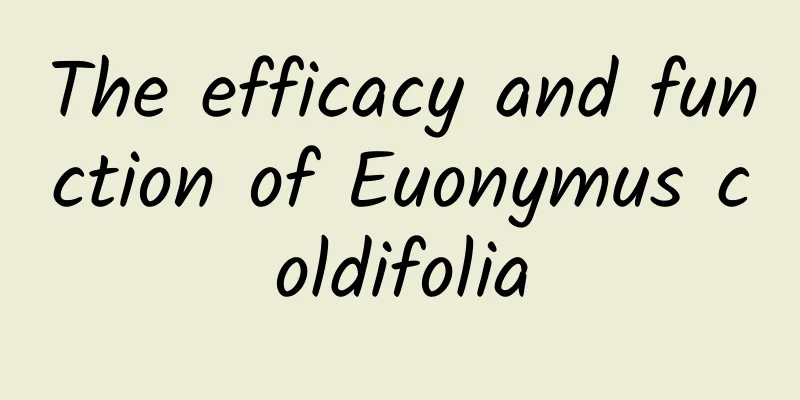The efficacy and function of Peach Ear Seven

|
Traditional Chinese medicine culture is profound and extensive, and Chinese medicinal materials account for a large proportion of it. Do you know about Taoerqi? What are its effects and functions, and how to eat it? I believe many people are very interested in it. Let me tell you one by one below. [Other names] Copper chopsticks (Shaanxi Chinese Herbal Medicine), small-leaf lotus (Commonly Used Chinese Herbal Medicines in Tibet), chicken moss (Gansu Health Newsletter (4): 37, 1972), Olemoselomajongwa (Tibetan name). [Source] It is the root and rhizome of Podophyllum , a plant of the Berberidaceae family. Harvest from July to August. [Original morphology] Perennial erect herb, 40 to 80 cm tall. The stem is green, smooth and ridged, with 2 to 3 leaves on the upper part. The leaves are shield-shaped, with straight stems up to 25 cm long, palmately 3-parted, several lobes to the base, and the lobes are further lobed to the middle, green, smooth on the upper side and hairy on the lower side. The flowers are solitary in the leaf axils, red; the bracts are lanceolate; the corolla has 6 petals, the outer 3 petals are longer, 4.5 cm long, and the inner 3 petals are smaller; there are 6 stamens; the stigma is multi-lobed. The berries are oval in shape and red in color. Seeds numerous, with aril. Flowering period is from April to May. [Habitat distribution] It grows in shady and moist places under forests in Zhongshan area. Distributed in Sichuan, Shaanxi, Gansu, Qinghai, Yunnan, Tibet and other places. [Properties] The rhizome is short and thick, reddish brown or light brown; the roots are thin and long, 15 to 25 cm long, about 2 mm thick, curved at the rhizome, light brown or brownish yellow on the surface, with fine longitudinal wrinkles, and attached with curled thin fibrous roots. The cross section is round and yellowish white. It has a pungent smell and a bitter taste. [Chemical composition] Four components were isolated from the root: podophyllotoxin; C21H22O2, melting point 122~4℃; quercetin, melting point 308~10℃; delphinidin. [Pharmacological action] In the early years, it was reported that podophyllin has a similar inhibitory effect on mitosis as colchicine on rabbit cells and human skin. Later, the liposome-podophyllotoxin was isolated, which can inhibit cell mitosis in the middle stage and has a significant inhibitory effect on animal tumors, but has a low therapeutic index, is highly toxic to humans, and has no medicinal value. Later, lignans with anti-cancer effects were isolated one after another, but they were still highly toxic and not suitable for systemic application. Its derivatives such as podophyllotoxin (SP-I) are currently used clinically. They are less toxic and do not damage the hematopoietic system. They can be used to treat solid tumors or combined with surgery and radiotherapy. They are effective for breast cancer, bladder cancer and skin cancer. The benzyl derivative of podophyllotoxin, SP-G, is less toxic and can be applied topically to treat tumors of the ear, nose, and pharynx. Another derivative of podophyllum lignans, VM-26, is also less toxic. It can not only terminate nuclear mitosis, but also prevent cells from entering the division phase, leading to rapid cell lysis. Low concentrations can inhibit the binding of thymine to DNA. It is effective for advanced lymphoreticular cell sarcoma, and its side effect is bone marrow suppression. 【Nature and flavor】 Bitter, warm. 【Functions and indications】 Treat rheumatic pain, cough and asthma, stomachache, and trauma. [Usage and Dosage] For oral use: decoct in water, 0.5-1 qian; or grind into powder. [Additional prescription] ① Treat cough due to fatigue and wind-cold: seven pieces of peach ear, two qian each of Taiqianghuo, Taibai Fritillaria, and Adenophora. Decoction in water. (Shaanxi Chinese Herbal Medicine) 【Clinical Application】 ①Treatment of cancer [Remarks] The leaves of Tibetan Podophyllum are deeply 3-lobed, the lobes no longer divide or only the lateral lobes are slightly 2-lobed, the flowers are white, occasionally pink. It is also used as medicine. 【Excerpt】 《*Dictionary》 In the above article, we introduced what Taoerqi is and understood its effects and functions. Taoerqi can improve our immunity. Taoerqi also has a therapeutic effect in health preservation and has many benefits to our body. |
<<: The efficacy and function of mantis bone massage
>>: The efficacy and function of mantis
Recommend
What are the benefits of Coconut Island Deer and Turtle Wine?
Coconut Island Deer and Turtle Wine is a kind of ...
The efficacy and role of small road yellow [picture]
Everyone is familiar with the small passing yello...
The efficacy and function of the small copper hammer
For many Chinese people, traditional Chinese medi...
The efficacy of wolfberry, hawthorn and red dates soaked in water
Wolfberry, hawthorn and red dates are three kinds...
The efficacy and function of Cassia tora
Do you know what Cassia tora is? If you know, do ...
What is the "Sky Eye" looking at? Could it have received alien signals?
Guizhou Sky Eye is the nickname of the 500-meter ...
Diarrhea and detoxification after drinking dandelion
I believe that everyone has been sharing the heal...
The efficacy and function of Silima
As the pressure of modern life increases, more an...
Is it possible for a person to eat only one thing?
Some time ago, the epidemic broke out in many pla...
Can psychiatric drugs cause menstrual cycle disorders in women? What experts say
Today, we are going to talk about the medical mys...
What is the correct way to eat Cordyceps?
Cordyceps is one of the most common edible fungi ...
The efficacy and function of the wrinkled snail
Nowadays, our living standards are constantly imp...
Does 6G only provide a network? Will it consume more power than 5G? A chart explains the hot topics about 6G
Since its birth in the 1980s, mobile communicatio...
Can Guizhi Decoction treat rhinitis?
Spring is here and everything comes to life. But ...



![The efficacy and function of dry paint [picture]](/upload/images/67ca74826391d.webp)





